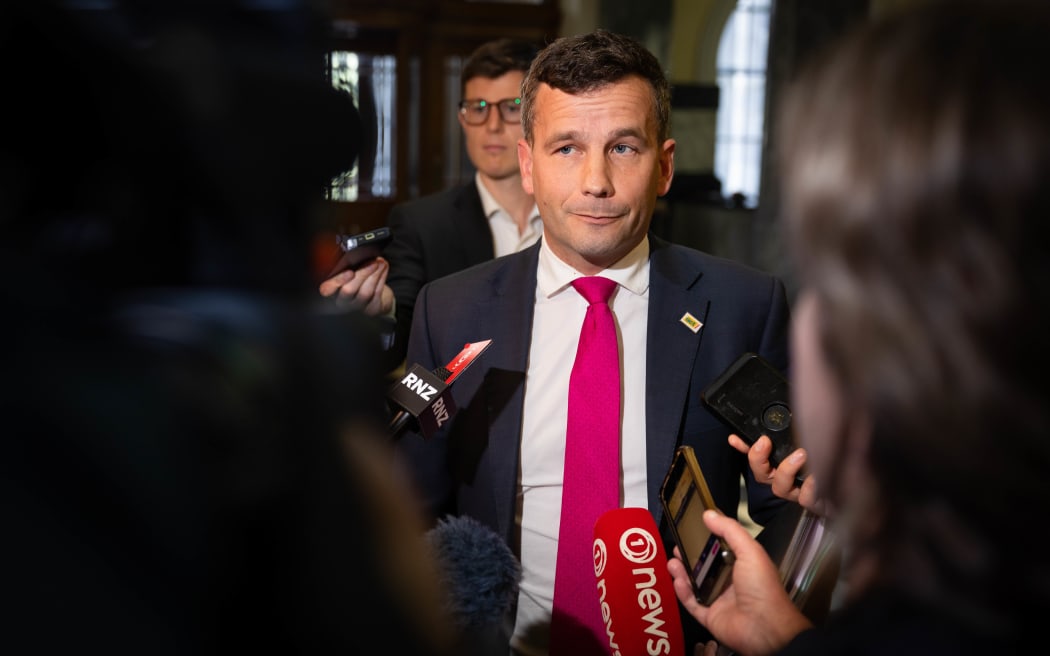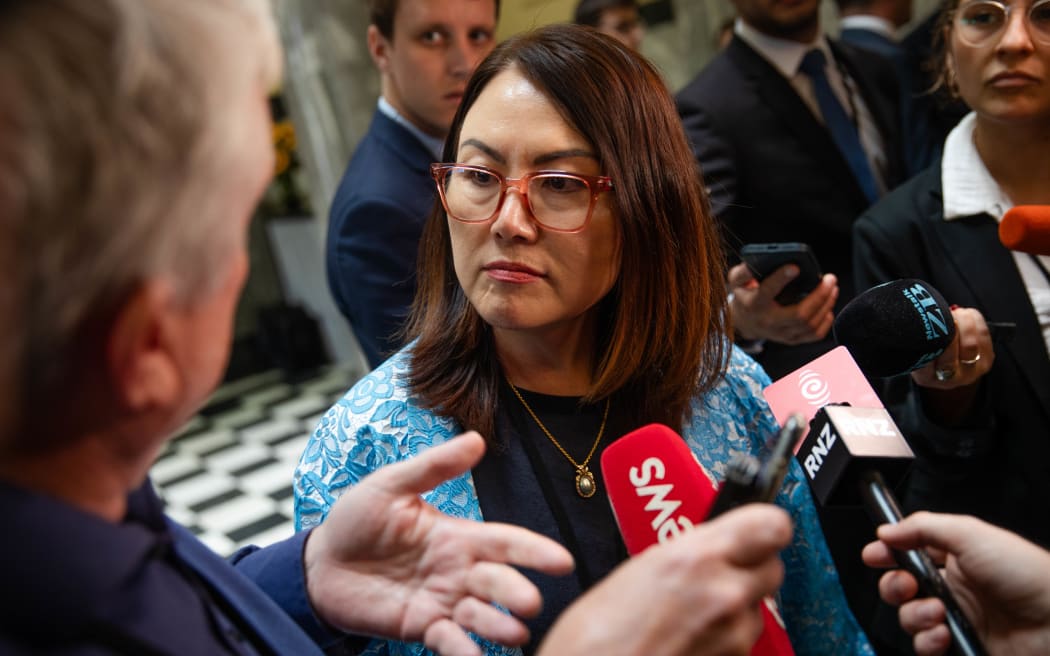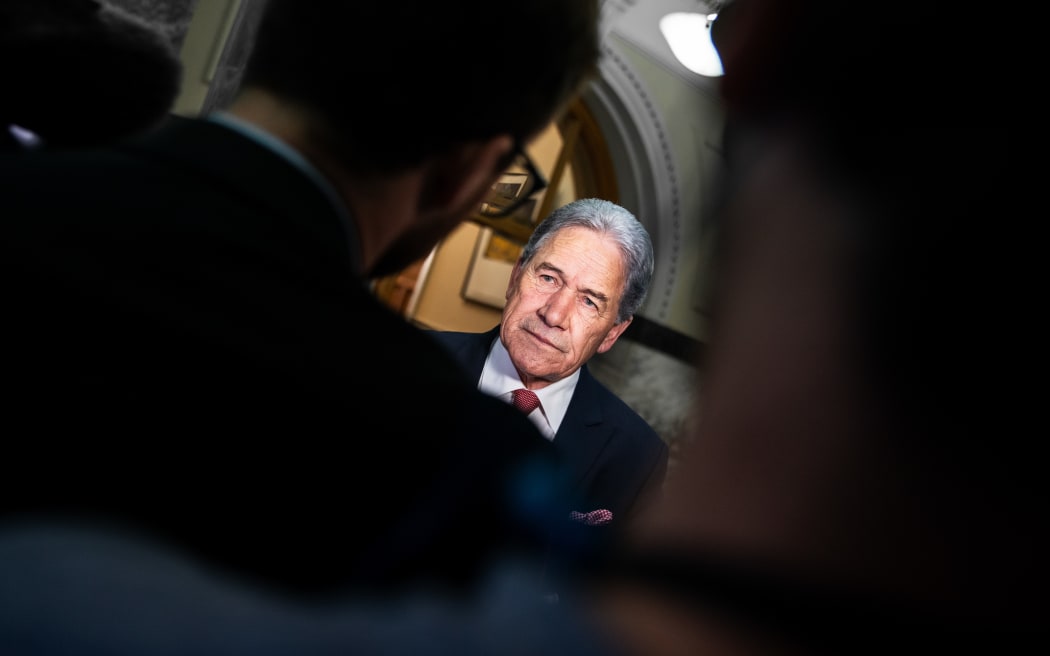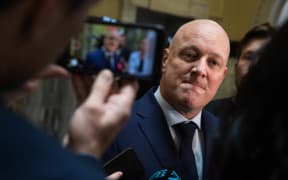
ACT leader David Seymour at Parliament on Thursday. Photo: RNZ / Angus Dreaver
ACT leader David Seymour is playing down his previous comments about TVNZ's profitability, saying people should not "read too much into it".
Seymour, who with his Associate Finance portfolio is also a shareholding minister for TVNZ, was speaking after the revelation Newshub and other self-funded local production by Warner Brothers Discovery would be shut down.
It would bring to an end 35 years of news broadcasting by the former TV3.
"I haven't actually made any comment about their dividend," Seymour told reporters at Parliament on Thursday.
"We've done what any shareholder would do and asked 'how is the return on equity that the company, in the same market that we're responsible for, doing?' ... It's just a prudent thing to do and I wouldn't read too much into it."
The previous day, he had wondered aloud about the state-owned broadcaster's financial position: "I think there's a question mark around whether the government's ownership of one TV channel and the poor returns it's demanded as a shareholder has actually contributed to an uncompetitive market," he said.
"It may well mean that they have to make a return on equity just like every other business in New Zealand is required to do ... for a long time people have raised the simple question: how is it possible that New Zealand has very very cheap television advertising and a major player owned by government that doesn't return a dividend as other companies are expected to do."
He acknowledged putting more pressure on the Crown entity - which made cuts as recently as November, reporting a $1.7 million profit in the 2023 financial year down from $6.2m - would only make it harder for what was looking likely to become the only remaining television news broadcaster.
"I think that's axiomatic - more pressure makes it harder to do things - however, a question that I think people really need to ask is: is the taxpayer getting good value for the companies it owns. Now, when you've just seen a major competitor leave the market because they don't think they can get enough return, I think it would be pretty irresponsible not to ask the basic question 'how's our one going'."
As the other shareholding minister for TVNZ, Broadcasting Minister Melissa Lee would not say directly whether she supported changing the approach to its dividend.
"I'm very focused on making sure that TVNZ is very focused on delivering to all of New Zealanders and become a content news creator that is actually of world standard," she said.

Broadcasting Minister Melissa Lee at Parliament on Thursday. Photo: RNZ / Angus Dreaver
"I think it is something that we will have to actually look at and see what happens ... I want TVNZ to be making world-class quality programmes and news that can actually be something that we can all be proud of."
Deputy Prime Minister and New Zealand First leader Winston Peters was not so keen on the idea.
"We're trying to solve the problem of one - that's TV3 or Newshub - I think attacking the other one at the same time maybe might not be the best idea."
However, he couldn't resist making an attack of his own.
"I'd be far more keen on TVNZ and RNZ getting back to being an independent and neutral, unbiased fourth estate," he said.
Asked who they were biased towards, Peters only said: "if you don't know that you don't know what day it is".

NZ First leader Winston Peters at Parliament earlier in the week. Photo: RNZ / Samuel Rillstone
In a written response, a TVNZ spokesperson said it was expected to operate as a competitive commercial entity under its Act, "and that's what we do".
"TVNZ last paid a dividend in FY21 ($15.1 million). We agreed with the Crown in FY22 and FY23 to hold dividend payments to allow for investment in our digital transformation so we can continue to meet our obligation under the TVNZ Act to provide high-quality content that is relevant to and enjoyed by NZ audiences.
"As we've seen across the media sector in recent years, delivering a financial performance that enables the payment of a dividend is challenging."
Lee defends comments
Lee defended her own comments from the previous day, in which she argued plurality in the media was not a concern "because the way that people consume media has actually changed ... it is no longer just broadcast".
She told reporters on Thursday she was taking the closure of Newshub "very seriously".
"Perhaps I wasn't as articulate as I could have been but I am actually taking this very seriously," she said. "I am very focused on this issue because plurality is very important, it is not just about television, it is not just about newspapers, but it is actually about diversity of voices."
She said that included concerns about regional news, and the availability of ethnic language media.
"I am looking at many things. I have not been sitting there idle. I have been looking, and talking to the sector. I have been talking to stakeholders, media companies, platforms, and talking to them as to what they could potentially do to invest more money into the New Zealand sector.
"I will be having continuous conversations with them all, stakeholders, to see if there is any relief available - but I do not see that it is the government's job to actually provide the relief."
She said she was considering a review of the Broadcasting Act 1989.
"[The] Broadcasting Act is very very old and everyone that I have actually spoken to have said that they've actually asked for this to be updated, and the previous government hasn't done that," she said.
The previous Labour government did begin consultation as part of a review of content regulation, including the Broadcasting Act and the Films, Videos and Publications Classification Act in the wake of the 2019 terrorist attacks on Christchurch mosques.
It subsequently made changes to the latter Act, and proposed the Fair Digital News Bargaining Bill, which would require offshore tech giants to pay news publishers for their content.
The bill is before the select committee, and while Lee has said she did not support it "in its current form", she suggested the government could make amendments.
Kordia charges
Lee said she had received advice that providing direct relief to Warner Brothers Discovery - a foreign-owned company - was not something the government should be doing.
She had also been told by the company's New Zealand boss Glen Kyne that reducing or removing the fees they paid to Kordia for the ability to broadcast terrestrial television "was not going to be helping them in this current situation", she said.
Seymour took a dim view of the idea.
"Kordia's another SOE so we can't direct them to change what we charge. We should expect them to be running themselves as a profit-maximising company and what they charge to other broadcasters for using those tower things ... is subject to regulations applicable to the sector," he said.
"They call it Kordia relief, I think in reality it's a pretty big change to take it from being a profit-making SOE to a public service, but I guess that would be an option."
Peters seemed to think something should be done, saying the fourth estate was "in crisis in my view" and the closure of Newshub was a 37-year backward leap.
"We've got to soberly sit down and examine what we're looking at," he said. "The idea of just ignoring it should not be happening, we should be very carefully, quietly thinking over the next few days and weeks: what can be done?"






